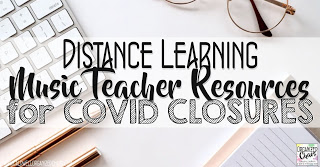It's the question we're all asking ourselves: what comes next? As we start closing out this period of crisis management, as government agencies and organizations start releasing guidelines and recommendations, with budgets on the chopping block and all our plans covered in red x's and question marks, how do we even begin to wrap our heads around what our future looks like as music teachers? We want to prepare for what we know will be a daunting task, but how? I obviously have no answers but here is how I am beginning to organize my thoughts.
What will music teaching look like in the fall? The only thing we know for sure is that we don't know. If your primary coping mechanism for stress is organizing and planning (hello, hi, that's me), that can be very disconcerting. But while we can't know what music teaching will look like in the fall- if it will be virtual or in a building, on a cart or in our rooms- we can think about the concepts we want to teach in a general sense. We can't predict the HOW but we can plan for the WHAT.
This is where writing your long-range plans based on skills and concepts is so important! We don't know if we'll be able to teach recorders, or sing in groups, or do movement activities. But we can decide when to teach half notes and when to teach rondo form. And by doing so, we can maintain continuity (to some degree) in our teaching even when we have to adjust our teaching platform mid-year (which will more than likely be the case)!
Here is how I am setting up my long-range plans for next school year to plan for what I can:
1. Identify the key skills and concepts for each grade
If you haven't already, you need a list of the most important skills and concepts you want to cover in each grade level. Narrow it down to the essentials, and make sure you're listing concepts and skills, not materials (if you aren't familiar with that distinction, read this post). For mine, I have a list of rhythm and pitch elements, expressive elements (dynamics, tempi, articulation), instrumental and vocal techniques, and harmonic and form elements for each grade. The list I normally have for my scope and sequence goes into much greater detail, but for this year I am just listing the most important ones- the concepts and skills that I build on year to year and that take time to process.
2. Map out skills and concepts by month
I am planning for 2-3 concepts per month, depending on how much time needs to be spent on each one, and a few of them (the rhythm and pitch elements in particular) I'm listing multiple times spread out over the year. The key here is I'm not planning too many things in each month, because I want this plan to be transferable to in-school or distance teaching, and I know I can't weave in multiple concepts in the course of a virtual lesson the same way I can in the classroom. I'm also realistic about the possibility that even less time could be given to music instruction altogether, and if there are breaks in the school year or significant absences I want it to be manageable to catch up.
3. Start lists of ideas
Now that I know the most basic concepts and skills I want to cover, I can start thinking of ideas to teach those concepts in different settings: how could I teach treble clef letter names if we're in the building but socially distancing, or if I'm giving online assignments? I'm creating lists of ideas for both scenarios by concept so that when the time comes, I at least have a starting point no matter what situation I find myself in at that time.
These are the things I think we can do now to make our jobs easier and more effective in the fall without wasting time and energy trying to predict the things we can't. This will be an ongoing process of adjusting and adapting, to be sure, but it has helped me to have something concrete to look at and feel confident that I have a roadmap for the year, no matter what else may happen. I know this whole situation can be stressful and overwhelming, but I hope this helps us all focus on the things we can control and try to let go of the rest!
If you want to get started on long-range plans this summer but are overwhelmed by the process, this free email course includes all of the templates and step-by-step directions you need to put everything together:
I'm continuing to compile all of my school closure-related posts on one centralized page- click below to visit:

Tuesday, May 26, 2020
Now What?
Labels:
Back to School
,
Distance Learning
,
Lesson Planning
,
Teacher
,
Teacher Tuesday
Subscribe to:
Post Comments
(
Atom
)




Thanks for a positive take on how to plan! I like to 'know' what I'm doing as well and you've given me a new way to prepare myself!
ReplyDeleteI'm so glad these thoughts were helpful for you- it has really helped me to feel like I have a positive way forward. Thank you so much for taking the time to comment!
Delete